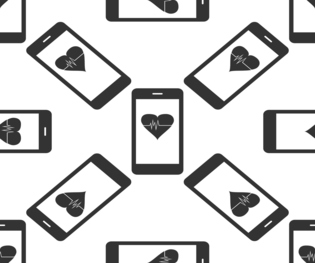Smartphone apps and wearable devices that can be used for health benefits are continuing to rise, not just in quantity, but also in quality and value to the health professional. Now, California-based Abbott Laboratories recently announced the FDA has approved the first insertable cardiac monitor that can link up with a smartphone app for monitoring “even the most difficult to detect cardiac arrhythmias, including irregular heartbeats” according to their press release.
Their new product, called the Confirm Rx™ Insertable Cardiac Monitor (ICM), is a “smartphone compatible ICM designed to help physicians remotely identify cardiac arrhythmias. With FDA clearance Abbott can now provide U.S. patients a new way to monitor for abnormal heart rhythms while staying connected to their physician remotely and being able to engage in their health care.”
Devices that assist or measure the heart from inside the body are not so new. An assistive heart monitor was first developed in the 1940’s using radioelectrocardiogram (RECG) to measure heart activity, with the device being further refined and developed in the 1960’s as the Holter Monitor, which had to be worn for 24-hour periods by patients.
The pacemaker was invented for internal implantation in 1958 although it took a few more years for it to be reliable, and to last a longer time. Today, they have advanced to include defibrillators in a single device, while becoming much smaller in size with latest inventions being pill-sized, and not necessarily attached to the heart directly. Several manufacturers now create devices that can be inserted via a leg catheter instead of invasive surgery.
Abbott’s Confirm Rx ICM is slim, easily inserted under the skin, and uses Bluetooth technology to connect to Merlin, AI-based software created specifically for healthcare. The device monitors cardio-activity to help diagnose arrhythmias and other heart illness, by recording ongoing heart performance, while the data is collected and sent on to the doctor’s smartphone for review. The device and app help speed up diagnosis by doing away with the need to connect to external transmitters, and is more convenient for wear and monitoring in the patient.
As regards to healthcare, the future is here today and we can only expect to see more developments of AI-connected app technology, as our smartphones become medical devices that will keep no secrets from our doctors.









